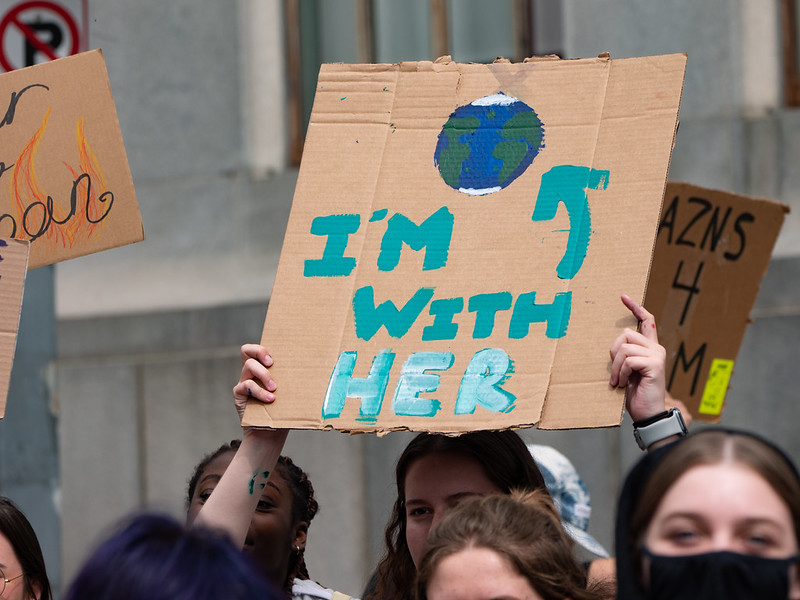Grounded in Their Communities and Hands-on Learning Across Disciplines, Libraries Can Be Critical Partners in Climate Action
As climate learning shifts to climate action, libraries are uniquely positioned to participate in a big way.
 |
|
Earth Day 2022, Pittsburgh. Photo by Mark Dixon. |
Florida, still grappling with Hurricane Ian and its effects, must consider the prospect of recovery in the face of ever-rising sea levels. In Pakistan, a record monsoon left one-third of the country under water, claiming more than 1,000 lives and displacing millions. Will this year be the tipping point for attention to climate change?
“We hope so,” says Laura Schifter. A senior fellow with the Aspen Institute’s Energy and Environment program, Schifter leads the This Is Planet Ed initiative. Announced in September 2022, the project defines four areas for broad mobilization across education: early childhood, K–12, higher ed, and children’s media.
Beyond imparting information through curricula, Planet Ed aims to empower kids to take part in the solution through meaningful action at the local level and beyond toward a sustainable and equitable future. And public sentiment is in support.
In a recent Aspen survey (results were about to be released at press time), most Americans believe that we need to support children and youth in addressing climate change. “Four out of five adults are saying that,” says Shifter.
A role for libraries
With out-of-school learning part of the stated goal of Planet Ed, where might libraries fit in?
“We’re seeing a need for more content, based on parent input. They’re not having conversations [about climate issues] at home, which implies the need for parents to have materials,” says Schifter. Librarians can be critical in partnering with families and the community.
At school, “climate issues should not be siloed as ‘science.’ Librarians can cross disciplines, tie narratives across social studies to student engagement and action,” she says. And public libraries can ground lessons within playspace learning.
Teaching climate issues can be scary, according to Schifter (presumably for both student and educator), unless you’re empowering people around solutions. “Two things need connecting,” she maintains, “Modeling solutions and making sure they’re in children’s lived experience, so they can see and know they are attainable.”
Polar bears are appealing, but as the default scenario for climate learning? Not so much. “Today, kids are seeing climate change in their backyards,” says Schifter. Take Florida. Nearly every district in the state closed due to Ian, impacting 2.5 million students.
Libraries working toward sustainability themselves are ideal for first-hand learning opportunities.
The Discovery Elementary School in Arlington, VA, the largest net zero energy school in the U.S., is one exemplar. Discovery’s Solar Lab enables students to access real-time data from the rooftop electric and water systems to track how the school creates and uses power. “If you can create that space [for meaningful engagement] in libraries, it’s an opportunity to help connect people to that information,” says Schifter.
School librarians get certified in sustainability
Sustainable practice in libraries is growing. In February, Joanna McCloskey of Seaford (NY) High School became the first school librarian certified by the Sustainable Libraries Initiative (SLI), which provides a structured process to align library efforts within specific areas, from organizational commitment and materials management to water, land use, and financial sustainability.
"Climate education can be overwhelming as the more you learn, the more you understand that we're not just talking about 'going green' but we are talking about economic models, how workers are treated, how systemic racism continues to make some neighborhoods more vulnerable than others," wrote Rebekkah Smith Aldrich, executive director of the Mid-Hudson Library System and co-founder of SLI, by email.
"The triple bottom line definition of sustainability, adopted by ALA [the American Library Association], allows folks to work on a mindset shift and be impactful in the face of an overwhelming global problem. It creates a framework through which to make better decisions at every level of work to ensure we're keeping people, the planet and the fiscal realities of our workplaces in balance."
More school librarians have received SLI certification this year, including Paula Michalak, district librarian at the Silver Creek Central School District in Silver Lake, NY. As part of her certification work, Michalak created a community internship program to enable high school students to explore careers in local industry.
Indeed, the promise of new jobs spurred by a greener economy was cited by New Jersey first lady Tammy Murphy alongside the September announcement of the statewide rollout of its landmark climate education program, the first of its kind in the nation.
The effort is "already part of the fabric of New Jersey schools," says Ewa Dziedzic-Elliott, president of the New Jersey Association of School Libraries, which has worked with its membership so that they have the tools to help teachers with climate change initiatives. "We are so embedded in the green culture in school."
Resources
- This Is Planet Ed
- New Jersey Climate Change Education Hub
- Sustainable Libraries Initiative
-
Education and Climate Provisions in the Infrastructure Investment and Jobs Act


RELATED
The job outlook in 2030: Librarians will be in demand
The job outlook in 2030: Librarians will be in demand
ALREADY A SUBSCRIBER? LOG IN
We are currently offering this content for free. Sign up now to activate your personal profile, where you can save articles for future viewing






Add Comment :-
Be the first reader to comment.
Comment Policy:
Comment should not be empty !!!